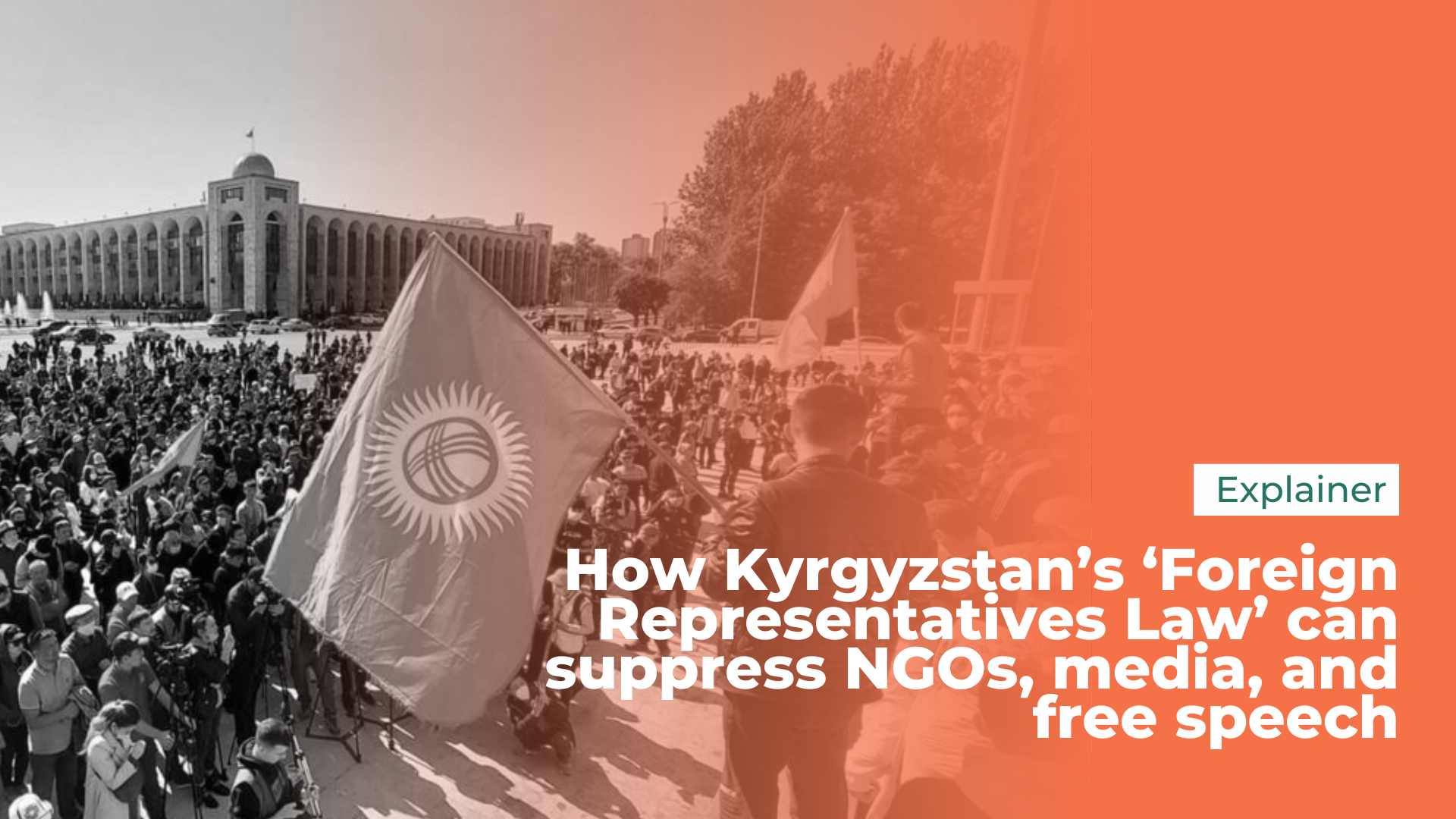By Fritzie Rodriguez
On 2 April 2024, Kyrgyz President Sadyr Japarov signed the ‘Foreign Representatives’ bill into law, following the parliament’s swift and overwhelming approval on 14 March.
The law requires non-governmental organisations (NGOs)–including media outlets and other non-profit organisations–that engage in ‘political activities’ and receive overseas funding to register as ‘foreign representatives,’ subjecting them to strenuous reporting and auditing requirements.
Non-compliance could lead to the suspension of the organisation’s activities for up to six months or a complete shutdown.
The bill was first introduced in 2014 but was voted down in 2016. Japarov’s presidency, however, has revived interest in the bill despite massive opposition from civil society, human rights defenders (HRDs), and the NGOs themselves.
Critics note how Kyrgyzstan’s Foreign Representatives Law is closely similar to a Russian legislation passed in 2012. The latter, according to critics, has undergone several amendments and is being used by the Russian Government to crackdown on NGOs, stifle dissent, and silence the media. With the approval of the Foreign Representatives Law, Kyrgyz HRDs are worried that their country might soon follow a similar fate.
The Asian Forum for Human Rights and Development (FORUM-ASIA) is deeply concerned over how the new law may be used to suppress the Kyrgyz people’s fundamental rights and freedoms, including that of peaceful assembly and association; press freedom; free speech; and right to information.
Why critics oppose the ‘Foreign Representatives Law’
While the Kyrgyz Government argues that the law’s strict audit requirements are aimed at financial transparency, small and medium-sized NGOs and news outlets may find such requirements too costly, unsustainable, and burdensome, forcing them to cease operations.
‘No country can develop and be secure if there are restrictions on civil space, especially today in a changing world. Citizens are primary [and] power is secondary for successful reforms in the face of new risks and disasters. Citizens must equally participate in the social and political life of the country,’ said Tolekan Ismailova, Director of Bir Duino-Kyrgyzstan, a FORUM-ASIA member organisation in Kyrgyzstan.
The law also allows authorities to closely scrutinise NGOs, their documents, internal activities, and expenditures. In 2023, United Nations Special Rapporteurs urged the Kyrgyz Government to withdraw what was then a draft version of the law, warning how granting the authorities ‘extensive oversight powers over non-commercial organisations’ may amount to ‘almost unrestricted administrative control.’ Various human rights organisations have made similar calls, all of which were ignored.
Furthermore, the law stigmatises NGOs by labelling them as ‘foreign representatives,’ thereby damaging their credibility in the eyes of the public. The law also requires organisations to tag their publications as ‘produced or distributed by a foreign representative,’ further manufacturing a distrust against NGOs and media outlets regardless of the value and veracity of their outputs.
‘Political activities’ may be broadly defined, making it difficult for NGOs to navigate their work without fear. Under the law, such activities cover ‘disseminating opinions taken by state organs; issuing public appeals to state organs and officials; and shaping socio-political views and convictions, including by conducting surveys of public opinion.’
‘Investments and grants through development banks should be subject to public scrutiny and ensure civil monitoring and control over development projects in Kyrgyzstan. Constitutional and fundamental rights of citizens should be respected by the authorities, ensuring the fulfilment of international obligations in the field of human rights and freedom as a guarantor of security and development,’ said Ismailova.
‘I hope that the Constitutional Court of the Kyrgyz Republic will repeal the law on foreign representatives, restoring legality and justice in the Kyrgyz Republic. Bir Duino’s petition to repeal the Law on Foreign Representatives was officially submitted on 17 May 2024,’ Ismailova added.
The law might also dissuade some international funding organisations from supporting local Kyrgyz NGOs that carry out invaluable and life-saving programmes across the country. Without funding support, many NGOs might have to lessen their activities, let go of staff, or even shut down.
Aside from Kyrgyzstan, several Asian governments have also started implementing or proposing laws that interfere with how NGOs operate, including the likes of China, Hong Kong, Cambodia, and India.
Call to Action
‘FORUM-ASIA is in solidarity with Kyrgyz civil society, NGOs, and HRDs who are courageously opposing the highly repressive Foreign Representatives Law. We urge the Kyrgyz Government to reconsider implementation of the law,’ said Mary Aileen Diez-Bacalso, Executive Director of FORUM-ASIA.
NGOs play a crucial role in society, helping protect civic space and ensure accountability and transparency within the government and its operations. Despite constraints in resources, NGOs have historically and continuously stepped up to educate, empower, and collaborate with the public, with a particular care for the marginalised, disenfranchised, and forgotten segments of society.
Alongside other members of civil society, NGOs are helping create positive and inclusive social change through advocacy and human rights work in education, health, environment, agriculture, food security, housing, among many other fields.




